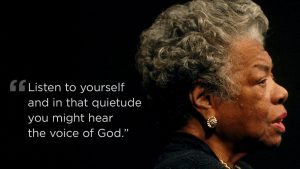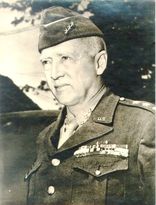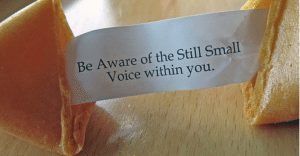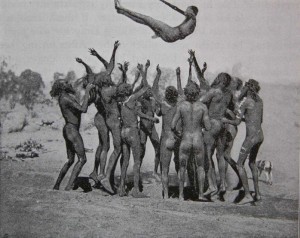Jack Kornfield – The Stories We Tell
 She was an American poet, memoirist, and civil rights activist. She’s best known for her series of seven autobiographies, which focus on her childhood and early adult experiences. She was respected as a spokesperson for black people and women, and her works have been considered a defense of Black culture. She’s Maya Angelou and here in video are her Top 10 Rules for Success, and her famous poem, Still I Rise.
She was an American poet, memoirist, and civil rights activist. She’s best known for her series of seven autobiographies, which focus on her childhood and early adult experiences. She was respected as a spokesperson for black people and women, and her works have been considered a defense of Black culture. She’s Maya Angelou and here in video are her Top 10 Rules for Success, and her famous poem, Still I Rise.
1. Just do right!
She became a poet and writer after a series of occupations as a young adult, including fry cook, sex worker, and nightclub dancer.
2. Be courageous
She was an actor, writer, director, and producer of plays, movies, and public television programs.
3. Love
In 1982, she earned the first lifetime Reynolds Professorship of American Studies at Wake Forest University.
4. Laugh
She was active in the Civil Rights movement and worked with Martin Luther King Jr. and Malcolm X.
5. Be a blessing to somebody
Beginning in the 1990s, she made around 80 appearances a year on the lecture circuit, something she continued into her eighties.
6. Turn struggles into triumphs
With the publication of I Know Why the Caged Bird Sings, Angelou publicly discussed aspects of her personal life.
7. You are talented
Attempts have been made to ban her books from some U.S. libraries, but her works are widely used in schools and universities worldwide.
8. Learn to say no
She made a deliberate attempt to challenge the common structure of the autobiography by critiquing, changing, and expanding the genre.
9. Always do your best
Her books center on themes such as racism, identity, family, and travel.
10. Keep rising
She received dozens of awards and more than 50 honorary degrees.
Originally posted Semptember 21, 2016 by: Evan Carmichael
Related Links:
Wisdom
Inspiration
Positive Thinking
After his wife died, Rick Rigsby was ready to give up. The bare minimum was good enough. Rigsby was content to go through the motions, living out his life as a shell of himself. But then he remembered the lessons his father taught him years before – something insanely simple, yet incredibly profound.
These lessons weren’t in advanced mathematics or the secrets of the stock market. They were quite straightforward, in fact, for Rigsby’s father never made it through third grade. But if this uneducated man’s instructions were powerful enough to produce a Ph.D. and a judge – imagine what they can do for you.
Join Rigsby as he dusts off time-tested beliefs and finds brilliantly simple answers to modern society’s questions. In a magnificent testament to the “Greatest Generation” which gave so much and asked so little in return, Lessons from a Third Grade Dropout will challenge you while reigniting your passion to lead a truly fulfilling life.
After all, it’s never too late to learn a little bit more about life – just ask the third-grade dropout.
 The intent of this page is not to be controversial or to make any claims as to what is fundamentally right or wrong. Rather, it is to merely raise the question about the future of religion in the context of the New Age movement beginning in the 1970’s and the rise of Spiritualism; the seeming move towards a One World Religion as exemplified by recent actions of Pope Francis; the leadership style of the Dalai Lama; the New Thought movement, and the idea of the rise (real or imagined) of a New World Order.
The intent of this page is not to be controversial or to make any claims as to what is fundamentally right or wrong. Rather, it is to merely raise the question about the future of religion in the context of the New Age movement beginning in the 1970’s and the rise of Spiritualism; the seeming move towards a One World Religion as exemplified by recent actions of Pope Francis; the leadership style of the Dalai Lama; the New Thought movement, and the idea of the rise (real or imagined) of a New World Order.
While quite heady to get one’s arms around, much less to comprehend, perhaps it is worth pausing to raise one’s own awareness and consider one’s belief system in the context of our changing world.
The Future of Religion: An Interview with Ninian Smart by Scott London
One of the most intriguing aspects the new religious scene in America is the pervasive mingling and mixing of different faiths and traditions. Never before in history have so many religious values and rituals coexisted within a single society. Much has been written about the cross-pollination of race, ethnicity and cultural values, but what happens when religions meet? Will the syncretism of the global village lead to some sort of universal religion, as some predict, or will it produce a vibrant mosaic of many different faiths? – Ninian Smart
One of the less controversial of countless videos on the topic of the One World Religion and New World Order.
https://youtu.be/AvBKut9iBcg
H.H. DALAI LAMA • Is there only one true religion?
Pope Francis has captivated the world with his kindness and progressive ideals. What specific actions has he taken that make him so popular?
Pope Francis – joins the 500th anniversary of the Lutheran church, and signs a joint declaration stating that the two traditions have more uniting them than dividing them.
The Future of World Religions: Population Growth Projections, 2010-2050 – Excerpt:
The religious profile of the world is rapidly changing, driven primarily by differences in fertility rates and the size of youth populations among the world’s major religions, as well as by people switching faiths. Over the next four decades, Christians will remain the largest religious group, but Islam will grow faster than any other major religion. If current trends continue, by 2050 …
https://mensfellowship.net/new-thought-2/
4 years ago Tom Beal lost his Dad with the same name to cancer at 56 years old. This is just a brief discussion regarding some lessons learned by studying Dale Carnegie and his book How To Stop Worrying and Start Living, and the topic of living in day tight compartments, plus the 2 types of worry. Tom also shares a new epiphany that came to him last night, that he feels will assist many people lead a more happy, purposeful, and fulfilling life, full of joy, adventure, and passion.
 How to Stop Worrying and Start Living is a self-help book by Dale Carnegie. It was first printed in Great Britain in 1948. Carnegie says in the preface to How to Stop Worrying and Start Living that he wrote it because he “was one of the unhappiest lads in New York”. He said that he made himself sick with worry because he hated his position in life, which he attributes to wanting to figure out how to stop worrying.
How to Stop Worrying and Start Living is a self-help book by Dale Carnegie. It was first printed in Great Britain in 1948. Carnegie says in the preface to How to Stop Worrying and Start Living that he wrote it because he “was one of the unhappiest lads in New York”. He said that he made himself sick with worry because he hated his position in life, which he attributes to wanting to figure out how to stop worrying.
The book’s goal is to lead the reader to a more enjoyable and fulfilling life, helping them to become more aware of, not only themselves, but others around them. Carnegie tries to address the everyday nuances of living, in order to get the reader to focus on the more important aspects of life.
***
An animated video short in plain language. A tad irreverent, but makes some good points.
When one conjures up images of General George Patton (portrayed by George C. Scott) in the epic movie, Patton, one can easily think of glory, but what about humility? Much has been written about Patton and his complex nature. Among other virtues, some say he was a man with an iron will combined with humility, at times veiled thinly behind his bluster.
 Perhaps it is easier to think of Nelson Mandel as a man with an iron will combined with the virtue of humility. It is written that despite Nelson Mandela’s profound impact on South Africa, democracy and the struggle for equality around the world, he remains a famously humble man. Mandela says it was necessary to transform himself into a modest man in order to change society. During an episode of The Oprah Winfrey Show, this former South African president shares the importance of humility with Oprah.
Perhaps it is easier to think of Nelson Mandel as a man with an iron will combined with the virtue of humility. It is written that despite Nelson Mandela’s profound impact on South Africa, democracy and the struggle for equality around the world, he remains a famously humble man. Mandela says it was necessary to transform himself into a modest man in order to change society. During an episode of The Oprah Winfrey Show, this former South African president shares the importance of humility with Oprah.
These two video clips serve to only scratch the surface of the topic: Of Glory and Humility.
***
Shared below is an excerpt of Patton’s writings which reveal his knowing about the true nature of glory in the context of victory. His words are poignant and expressed with humility.
“For over a thousand years Roman conquerors returning from the  wars enjoyed the honor of triumph, a tumultuous parade. In the procession came trumpeteers, musicians and strange animals from conquered territories, together with carts laden with treasure and captured armaments. The conquerors rode in a triumphal chariot, the dazed prisoners walking in chains before him. Sometimes his children robed in white stood with him in the chariot or rode the trace horses. A slave stood behind the conqueror holding a golden crown and whispering in his ear a warning: that all glory is fleeting.” – George S. Patton
wars enjoyed the honor of triumph, a tumultuous parade. In the procession came trumpeteers, musicians and strange animals from conquered territories, together with carts laden with treasure and captured armaments. The conquerors rode in a triumphal chariot, the dazed prisoners walking in chains before him. Sometimes his children robed in white stood with him in the chariot or rode the trace horses. A slave stood behind the conqueror holding a golden crown and whispering in his ear a warning: that all glory is fleeting.” – George S. Patton
What Is Emotional Intelligence? – Emotional intelligence is the ability to identify and manage your own emotions and the emotions of others. It is generally said to include 3 skills:
1. Emotional awareness, including the ability to identify your own emotions and those of others;
2. The ability to harness emotions and apply them to tasks like thinking and problems solving;
3. The ability to manage emotions, including the ability to regulate your own emotions, and the ability to cheer up or calm down another person.
The UC Davis Executive Leadership Program is a transformative, interactive seminar series that will expand your ability to confidently guide and direct your organization. Gain practical techniques, effective strategies and essential personal insight to become a passionate, inspiring leader. In this video, instructor Mitchel Adler, Psy.D., CGP, discusses emotional intelligence and how good leaders use it to their advantage.
 The subconscious mind can make roughly 10-million observations in any one setting, whereas, the conscious mind can only keep track of about 100. This means that 99.999% of the observations you make you are not consciously aware of.
The subconscious mind can make roughly 10-million observations in any one setting, whereas, the conscious mind can only keep track of about 100. This means that 99.999% of the observations you make you are not consciously aware of.
Intuition can be described in several ways such as the ability to understand something immediately, without the need for conscious reasoning. Some use the term intuition in the same context as instinct, but if looked at closely, instinct refers more to the fixed pattern of behavior in response to a certain stimuli.
While both intuition and instinct can be sparked in the same instant by the same event, instinct is tied more closely to a fight, flight or freeze responses; whereas, intuition is tied more closely to deep listening to the still small voice within, those 10-million observations coupled with one’s past experiences, and involves some level of judgement. In a fleeting instant when a feeling is triggered instinct may cause the body to react instantaneously. Conversely, intuition may say stop, make another choice. –
Said another way, we use the words instinct and intuition interchangeably. And while they do exist on the same spectrum, there’s still a crucial difference between the two ideas. Instinct comes from the word instinctus, or, “impulse,” meaning it’s a biological tendency. It’s the transient reaction that happens in our bodies, apropos of right now. Intuition comes from the word intuitio, or, “consideration,” meaning it’s an accumulated belief. It’s the ongoing collection of experiences, apropos of everything up until now. –
So this raises good question: How does one connect in with those 10-million observations… what many call the still small voice within..?
What is your still small voice saying to you? Are you listening?
https://mensfellowship.net/what-do-you-want-to-be-when-you-grow-up/

Photo by Christopher Howell – YogaHike
What are our modern day rites of passage? Have we lost this part of our culture? What are the consequences if we have?
Wikipedia – A rite of passage is a ritual event that marks a person’s transition from one status to another. Rites of passage explore and describe various notable milestones in an individual’s life, for any marked transitional stage, when one’s social status is altered.
 The concept of rites of passage as a general theory of socialization was first formally articulated by Arnold van Gennep in his book The Rites of Passage to denote rituals marking the transitional phase between childhood and full inclusion into a tribe or social group.[1] Van Gennep’s work exercised a deep impact on anthropological thought.[2] Milestones include transitions from puberty, junior, middle and high school, coming of age, marriage, family and death. Initiation ceremonies such as baptism, akika, upanayana, confirmation and Bar or Bat Mitzvah are considered
The concept of rites of passage as a general theory of socialization was first formally articulated by Arnold van Gennep in his book The Rites of Passage to denote rituals marking the transitional phase between childhood and full inclusion into a tribe or social group.[1] Van Gennep’s work exercised a deep impact on anthropological thought.[2] Milestones include transitions from puberty, junior, middle and high school, coming of age, marriage, family and death. Initiation ceremonies such as baptism, akika, upanayana, confirmation and Bar or Bat Mitzvah are considered important rites of passage for people of their respective religions. Rites of passage show anthropologists what social hierarchies, values and beliefs are important in specific cultures.
important rites of passage for people of their respective religions. Rites of passage show anthropologists what social hierarchies, values and beliefs are important in specific cultures.

Selfish, Good or Bad